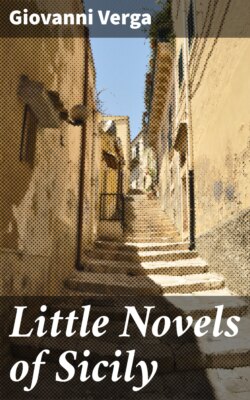Читать книгу Little Novels of Sicily - Giovanni Verga - Страница 3
ОглавлениеGiovanni Verga, the Sicilian novelist and playwright, is surely the greatest writer of Italian fiction, after Manzoni.
Verga was born in Catania, Sicily, in 1840, and died in the same city, at the age of eighty-two, in January, 1922. As a young man he left Sicily to work at literature and mingle with society in Florence and Milan, and these two cities, especially the latter, claim a large share of his mature years. He came back, however, to his beloved Sicily, to Catania, the seaport under Etna, to be once more Sicilian of the Sicilians and spend his long declining years in his own place.
The first period of his literary activity was taken up with "Society" and elegant love. In this phase he wrote the novels Eros, Eva, Tigre Reale, Il Marito di Elena, real Italian novels of love, intrigue and "elegance": a little tiresome, but with their own depth. His fame, however, [Pg viii] rests on his Sicilian works, the two novels: I Malavoglia and Mastro-Don Gesualdo, and the various volumes of short sketches, Vita dei Campi (Cavalleria Rusticana), Novelle Rusticane, and Vagabondaggio, and then the earlier work Storia di Una Capinera, a slight volume of letters between two school-girls, somewhat sentimental and once very popular.
The libretto of Cavalleria Rusticana, the well-known opera, was drawn from the first of the sketches in the volume Vita dei Campi.
As a man, Verga never courted popularity, any more than his work courts popularity. He kept apart from all publicity, proud in his privacy: so unlike D'Annunzio. Apparently he was never married.
In appearance, he was of medium height, strong and straight, with thick white hair, and proud dark eyes, and a big reddish moustache: a striking man to look at. The story Across the Sea, playing as it does between the elegant life of Naples and Messina, and the wild places of southeast Sicily, is no doubt autobiographic. The great misty city would then be Milan.
Most of these sketches are said to be drawn from actual life, from the village where Verga [Pg ix] lived and from which his family originally came. The landscape will be more or less familiar to any one who has gone in the train down the east coast of Sicily to Syracuse, past Etna and the Plains of Catania and the Biviere, the Lake of Lentini, on to the hills again. And anyone who has once known this land can never be quite free from the nostalgia for it, nor can he fail to fall under the spell of Verga's wonderful creation of it, at some point or other.
The stories belong to the period of Verga's youth. The King with the little Queen was King Francis of Naples, son of Bomba. Francis and his little northern Queen fled before Garibaldi in 1860, so the story So Much For the King must be dated a few years earlier. And the autobiographical sketch Across the Sea must belong to Verga's first manhood, somewhere about 1870. Verga was twenty years old when Garibaldi was in Sicily and the little drama of Liberty took place in the Village on Etna.
During the 'fifties and 'sixties, Sicily is said to have been the poorest place in Europe: absolutely penniless. A Sicilian peasant might live through his whole life without ever possessing as much as a dollar, in hard cash. But after 1870 the great [Pg x] drift of Sicilian emigration set in, towards America. Sicilian young men came back from exile rich, according to standards in Sicily. The peasants began to buy their own land, instead of working on the half-profits system. They had a reserve fund for bad years. And the island in the Mediterranean began to prosper as it prospers still, depending on American resources. Only the gentry decline. The peasantry emigrate almost to a man, and come back as gentry themselves, American gentry.
Novelle Rusticane was first published in Turin, in 1883.
D. H. LAWRENCE.
[Pg 11]
